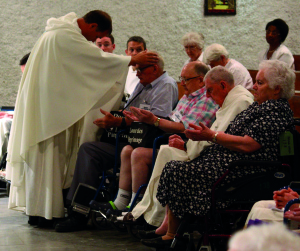This article is the final offering in our series on the Sacraments. It is fitting then that it is devoted to the Sacrament of the Anointing of the Sick. This is the final Sacrament of the Christian community before they depart this life in search of their Heavenly reward. ‘ “By the sacred anointing of the sick and the prayer of the priests the whole Church commends those who are ill to the suffering and glorified Lord, that he may raise them up and save them. And indeed she exhorts them to contribute to the good of the People of God by freely uniting themselves to the Passion and death of Christ.”’ (CCC 1499)
From this quote we learn two things. The first element is that through this Sacrament the priests and the Church commend to Jesus Christ, the risen Lord, those who are ill so that he might welcome them into his Heavenly kingdom.
Before we discuss this Sacrament any further, we will just take a moment to look at the concept of illness, as described by the Catechism of the Catholic Church. ‘The Anointing of the Sick “is not a sacrament for those only who are at the point of death. Hence, as soon as anyone of the faithful begins to be in danger of death from sickness or old age, the fitting time for him to receive this sacrament has certainly already arrived.”’ (CCC 1514)
So then, it is fitting to say that through the Sacrament of the Anointing of the Sick those who are gravely ill through sickness or old age are commended by the Church on earth to the care of the risen Lord so that he might save them and welcome them into his Heavenly Kingdom. There is often a little confusion as to when the Sacrament of the Anointing of the Sick should be administered and at one point in the Church’s history, this Sacrament was referred to as Extreme Unction, thus placing the emphasis on the imminent death of those receiving the Sacrament.
Whilst it still remains the case that those at the point of death should receive this Sacrament, we need also be aware that those who suffer through grave illness or old age, where there is a danger of death, should also receive this Sacrament. There is no need to wait until just prior to the death of that person.
There is an additional side to this Sacrament wherein the Church encourages those who receive it, to offer their suffering in unity with the Passion of Jesus and participate, in this particular way, to the mission of the people of God. Therefore, they join with Christ in the work of salvation. Indeed, this participation in the work of salvation is one undertaken by many of the Church’s saints. Some who immediately spring to mind are St John Vianney and St Therese of Liseux and recently canonized Mary MacKillop.
There are four main effects of the Sacrament. First of all, we receive a particular grace, through the Holy Spirit, of strengthening, peace and courage to endure the bodily affliction. This grace is meant to lead the sick person to a healing of the soul firstly, but also the body if God so wills it. We achieve union with Christ’s redemptive Passion through our suffering and thus participate in his saving work.
We receive an ecclesial grace whereby we are interceded for by the Church and the communion of saints and we in turn, contribute to the sanctification of the Church and it’s members. And finally, we are given a preparation for our final journey and are fortified so as to be prepared for the final struggles before we enter the Father’s house. (cf. CCC 1520-3)
Much like the other Sacrament of Healing, Penance, the Anointing of the Sick can be administered on more than one occasion and can only be administered by priests or bishops. The Catechism explains that ‘ If a sick person who received this anointing recovers his health, he can in the case of another grave illness receive this sacrament again. If during the same illness the person’s condition becomes more serious, the sacrament may be repeated. It is fitting to receive the Anointing of the Sick just prior to a serious operation. The same holds for the elderly whose frailty becomes more pronounced.’ (CCC 1515)
The Sacrament of the Anointing is not confined to a church. It can take place at a family home or in a hospital room and so on. It can also be administered both in a group or singular situation. For instance, some parishes hold an “Anointing Mass” regularly and administer the Sacrament of the Anointing to all those present at that Mass who are ill.
Similarly to the other Sacraments, we should endeavour to be in a state of grace so as to receive the most graces from the reception of this sacrament. Therefore it is ideal, though not always possible, that we should receive the Sacrament of Confession prior to the Anointing of the Sick, and receive the Eucharist following.
‘Thus, just as the Sacraments of Baptism, Confirmation and the Eucharist form a unity called “the sacraments of Christian initiation,” so too it can be said that Penance, the Anointing of the Sick and the Eucharist as viaticum constitute at the end of Christian life “the sacraments that prepare for our heavenly homeland” or the sacraments that complete the earthly pilgrimage.’ (CCC 1524)
Viaticum – the original Latin definition is: provision for journey. Thus viaticum takes meaning here as being the necessary provision for the journey to eternal life: ‘Those who eat my flesh and drink my blood have eternal life, and I will raise them up on the last day;’ (John 6:54).
Originally posted 2015-01-20 22:32:24.

